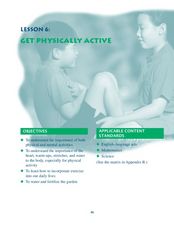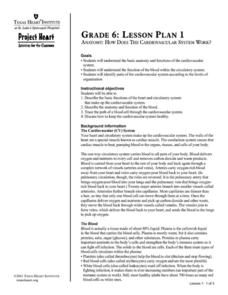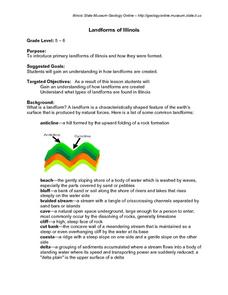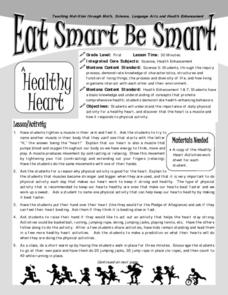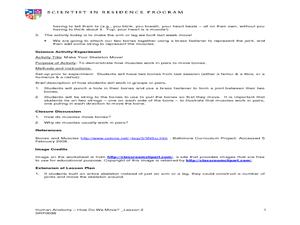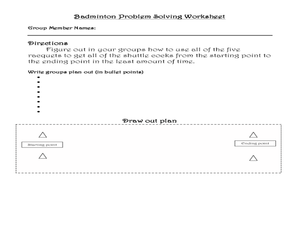Curated OER
Get Physically Active
Learners discover the importance of water. In this physical education science lesson, students consider mental and physical activities. Learners find their pulse and measure their heart rate. Students discuss the importance...
Baylor College
Body Strength
Your young learners will discover how muscular strength and endurance can increase with this truly hands-on activity! Beginning by writing an acrostic for the word strength, class members then engage in tracking their ability to squeeze...
Texas Heart Institute
Exercise: What Kinds of Activities Are Best?
What happens in the muscles during anaerobic and aerobic exercise, and how does this affect the heart and our overall health? A cross-curricular lesson that introduces learners to the lifelong benefits of exercise, including the...
Curated OER
Survival: The Human Body in Extreme Environments
Students name and describe the major systems that work together as a unity to monitor and regulate the human body as it goes about its business of securing the essential requirements for life. They identify specific human features and/or...
Baylor College
Activity and Exercise
Leave it to the classic jump rope to get your class excited about physical activity! Your class will begin by discussing the benefits of jumping rope as a form of exercise and learning a few different types of jumps. Then in groups of...
Cornell University
The Physics of Bridges
Stability is key when building a bridge. Scholars explore the forces acting upon bridges through an analysis of Newton's Laws and Hooke's Law. The activity asks individuals to apply their learning by building a bridge of their own.
Curated OER
Human Body Lessons
Students read "The Magic School Bus in the Human Body" and discuss the importance of maintaining a healthy body. They create a hinge and joint paper skeleton, follow the journey of a hamburger through the digestive tract, jump rope and...
BioEd Online
Good Stress for Your Body
Stress the importance of the different types of pressure our mind and body experience in a lesson about how certain types of stress are actually necessary and good for our bodies. As astronauts and people with injuries can attest, not...
Curated OER
Human Anatomy- How Do We Move?
Learners examine the muscular system. In this muscular system lesson, students first draw a realistic representation of their leg or arm bones. Learners do several activities to attach these bones to "joints" with string to simulate...
Texas Heart Institute
Anatomy: How Does the Cardiovascular System Work?
How can the circulatory system compare to a city map? Pupils distinguish the "roadways" and "vehicles" of the cardiovascular system, compare the anatomy and function of veins and arteries, and review different types of blood cells with...
Howard Hughes Medical Institute
Using DNA to Explore Lizard Phylogeny
In a fun and interactive two-day lesson, learners sort anole lizard pictures by appearance. Next, they watch a video about the anoles and re-sort based on the information in the video. In addition to physical characteristics, budding...
Curated OER
Landforms of Illinois
Fifth and sixth graders are introduced to the primary landforms of Illinois and discover how they were created. Landform cards are made for each pupil. They use the twenty-questions format until they have identified each one. Then,...
Centers for Ocean Sciences
Ocean and Great Lakes Literacy: Principle 1
Is your current lesson plan for salt and freshwater literacy leaving you high and dry? If so, dive into part one of a seven-part series that explores the physical features of Earth's salt and freshwater sources. Junior hydrologists...
Montana Office of Public Instruction
Eat Smart Be Smart
Get children's blood pumping with this primary grade lesson on the human heart. After learning about the important role this muscle plays in the human body, students monitor their heart rates and discover the importance of...
Curated OER
Human Anatomy - How Do We Move?
Fifth graders discover how blood moves around the body. In this circulatory system lesson, 5th graders feel their pulse before and after exercise. Students count their heart rate. Students use the scientific method to record...
Curated OER
The Bones of the Body
Third graders recognize the bones that make up the human body. They become more aware of the human body. Students experiment with this concept with a variety of items. They also work on this concept with dribbling a ball.
Curated OER
Your Amazing Body
Students examine the different body systems and how they are interdependent on each other. In this body systems instructional activity students draw the body and its parts.
It's About Time
Run and Jump
Has your class wondered how fast a human could run or how high they are capable of jumping? Help them understand these concepts as they explore acceleration and use an accelerometer to make semiquantitative measurements of acceleration...
Kenan Fellows
How Much Energy Is That Anyway?
The fifth lesson in the six part series introduces units of energy including calories, Calories, and joules. Scholars determine the energy released when eating a snack and during activity.
Curated OER
Sports and Exercise Activity
Eighth graders practice utilizing motor skills by participating in different sports activities. In this physical education lesson, 8th graders participate in racquetball, shuttle cock, and baseball style activities in order to...
Curated OER
Paper Suspension Bridges: You Want Me To Go Up There?
A few class periods will be required to complete this physics investigation with your high schoolers. There is an unavailable video written into the lesson plan, but there is plenty of material here to bridge the gap. Two terrific...
Curated OER
The Benefits of Exercise
Ways are identified in which exercise benefits the nervous, respiratory, and cardiovascular systems of the human body in this presentation. It also includes definitions for and examples of aerobic and anaerobic exercise, as well as...
Curated OER
Walk a Mile for a Burger?
Students are introduced to the pedometer, and use this tool to associate physical activity (physical energy) with calories burned (chemical energy). They comprehend the making and burning of energy.
NOAA
Tides
Low tides, high tides, spring tides, neap tides, diurnal tides, semidiurnal tides, mixed tides ... just how many types of tides are there? The 10th installment of a 23-part NOAA Enrichment in Marine sciences and Oceanography (NEMO)...
